If you’re all in on WordPress, have dreams of creating high-performance websites that can handle all the traffic the internet might send its way, or already have a WordPress site that gets tens of thousands of visitors every month, then WP Engine should be at the top of your list.
The entire premise of WP Engine is that it was conceived to be—and remain—100% focused on optimizing WordPress performance.
In case you’re wondering, it does what it claims it does really, really well.
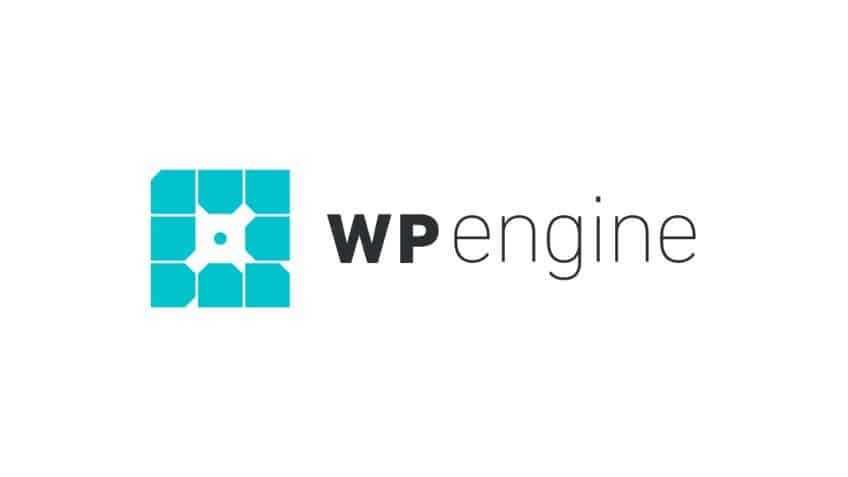
How WP Engine Stacks Up to Other Web Hosts
WP Engine’s laser focus on WordPress performance comes at a price. With it, you won’t get some of the beginner-friendly hand holding that you receive from other hosts out there, like DreamHost or SiteGround. But if you’re comfortable taking a DIY approach to your web hosting and you have the knowledge to back it up, WP Engine is a great way to boost your site’s performance.
If you’re on a tighter budget, a complete beginner, or building a brand new site, we recommend going with something else. If that’s you, check out our full guide on the best web hosting solutions.
Where WP Engine Stands Out
In keeping with its goal of being completely WordPress-centric, WP Engine keeps things (relatively) simple, and straightforward. Plus, it’s second to none for website performance.
Ease of Use (the good)
Signing up for WP Engine is nice and straightforward. Pick your preferred hosting plan, provide basic personal and payment information, and you’re almost done. Almost.
You will still have a couple choices to make. One is the data center location you want. This is important for high-traffic sites, since the closer your data center is to the majority of your site visitors, the better your site performance will be for them.
Some hosting providers on this list don’t give you an option at all. They choose for you. Others offer three or four locations around the world and you pick the one you prefer.
Not WP Engine. It gives you 10 total server locations to choose from, spanning the entire globe.
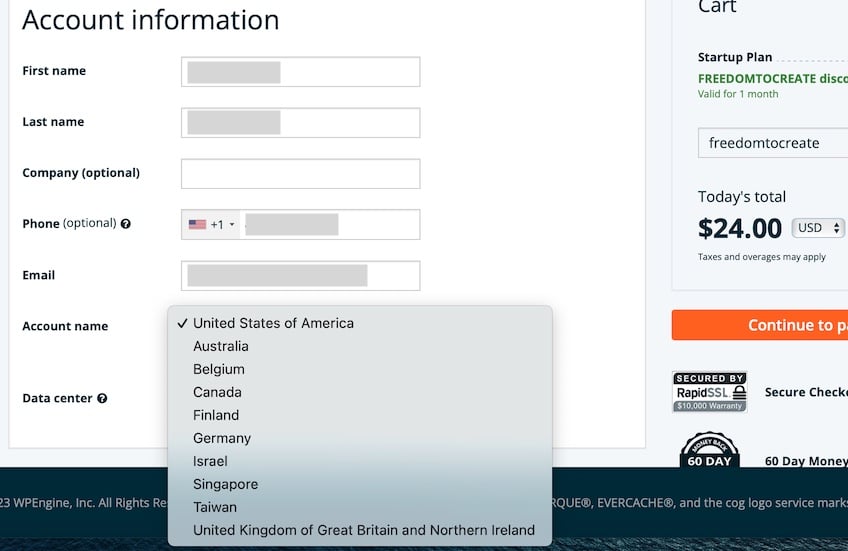
That can be a huge benefit for, say, ecommerce site owners with international customer bases. Your plan can lean on the data center in Germany, for example, to ensure speedy load times for your fans in the European Union.
You also will have the opportunity to select from numerous add-ons that can enhance your hosting plan. For most people new to web hosting, assessing the options and their usefulness might be overwhelming. But if you’re an experienced website creator or manager, you’ll know what you need.
On that note, keep in mind that these add-ons will add to your monthly hosting fees.
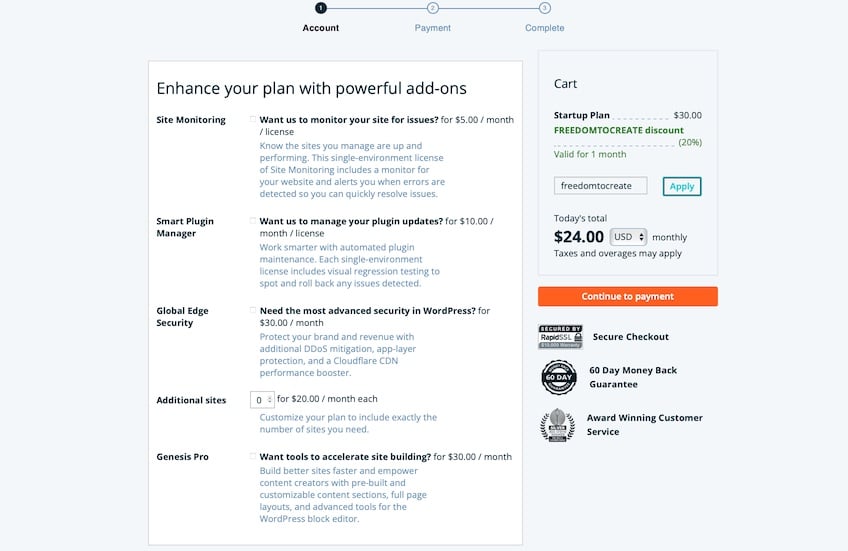
One thing that is really different with WP Engine is that they don’t even bother asking you which domain you plan to use, nor do they offer a temporary one. They skip this altogether during the signup process. Instead, they leave it to you to add that information later.
For anyone newer to web hosting, this could be a challenge. Again, this is WP Engine’s way of acknowledging that they expect their customers to be on the savvier side of website management.
Your options for payment are credit or debit card only, which is a bit disappointing considering so many others allow non-card options like PayPal.
Once you’re through the signup process, WP Engine does something unique on this list—it doesn’t activate your new account for you. Instead, it puts the burden on you, and you have seven days to do so. You’ll get an email with instructions on how to do it.
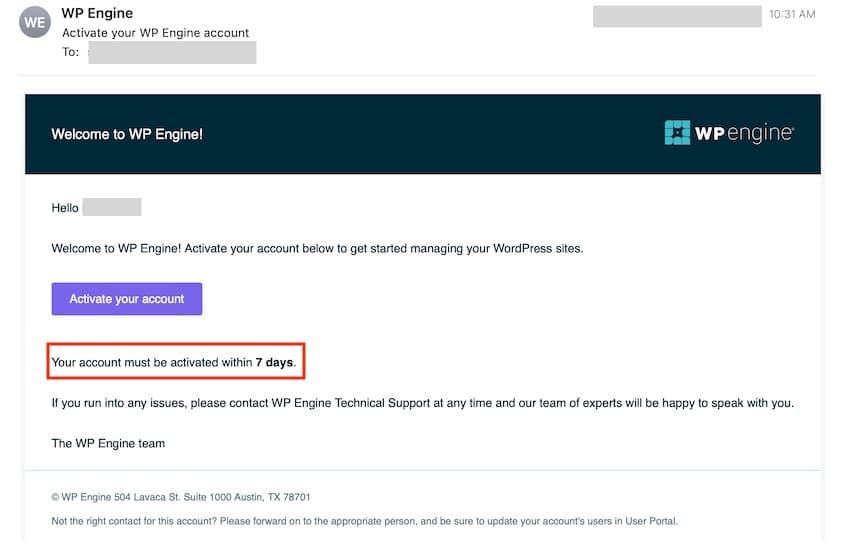
Once you activate your account, you’ll get a second email prompting you to log into your newly active account. You also have an opportunity to schedule a free onboarding call. None of the other providers we tested offered an onboarding call, so this is a major chance to get help and your questions answered if you need it.
Inside your account, WP Engine makes it easy to get familiar with its functionality.
You’ll see a list of Get Started links on your payment confirmation screen that take you to the tools you’ll need to get going on your new website. This is one area where they do offer guidance to new customers.
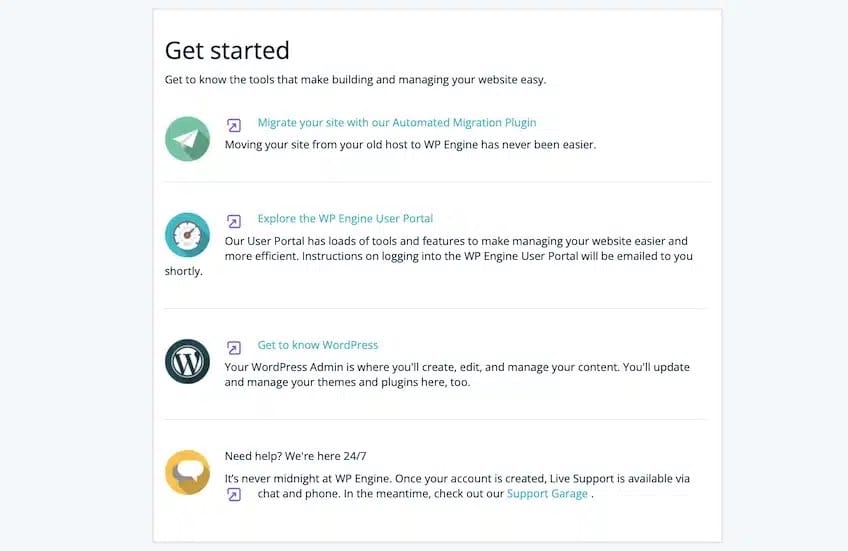
You’ll also get a separate welcome email with links to important features, including your User Portal.
The User Portal is where you can manage all website tasks (you won’t find cPanel anywhere in WP Engine). It’s clean and simple, with an efficient sidebar menu that links to the common tasks you’ll use here, like managing users or finding billing information.
We find it among the easiest to use of all the hosts we’ve tried–it lived up to our expectations as a hosting provider of this caliber.
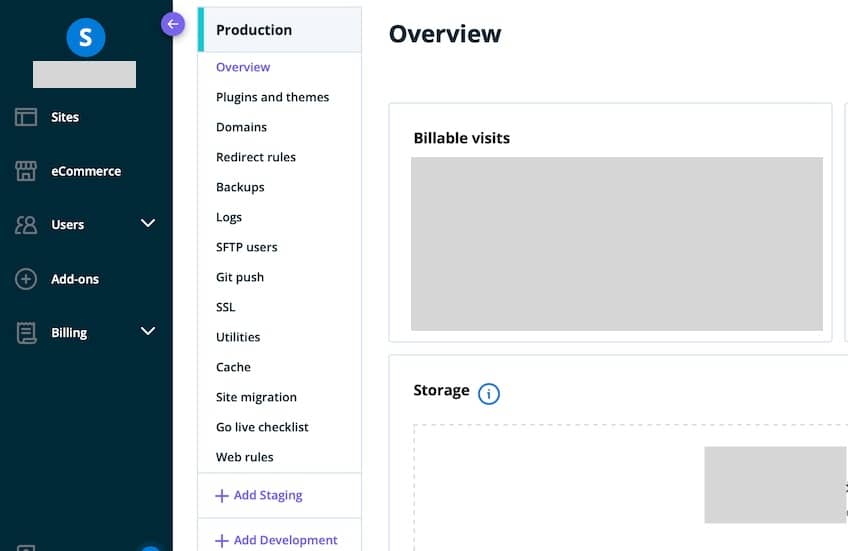
You can choose to take a quick tour of your User Portal on your first visit, or you can skip it and go back to it later on, if you’d like.
One more thing we really like about WP Engine is that it makes it simple to add your first site to the hosting platform. It offers a welcome screen and invites you to add a new site or transfer an existing one with a single click. This isn’t quite the level of guidance that you get with, say, Bluehost or Hostinger, but it does help you get started faster.
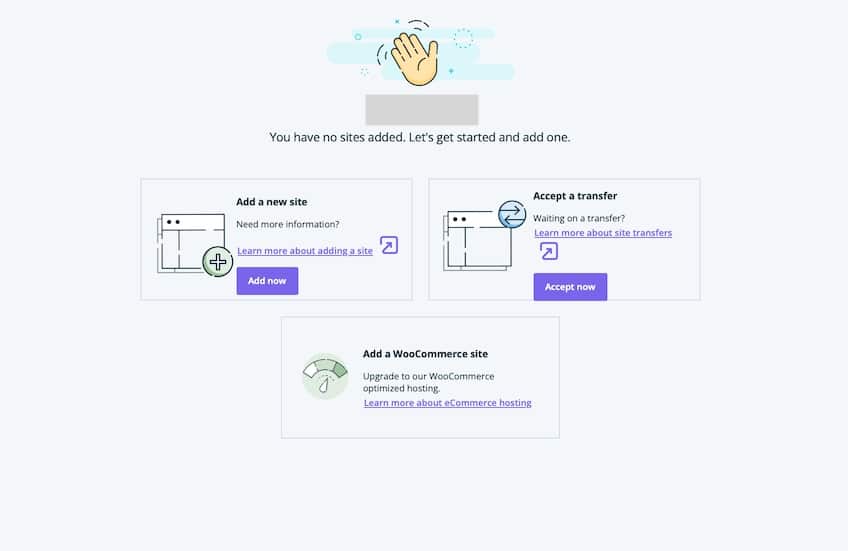
Once you have a site added, managing it is straightforward via a separate side panel menu specific to each site you host with WP Engine. Within it, you’ll get a long list of options to work with, covering:
- Plugins and themes
- Domains
- Redirect rules
- Backups
- Logs
- SFTP users
- Git push
- SSL
- Utilities
- Cache
- Site migration
- Go live checklist
- Web rules
The Go Live Checklist is another feature we totally love. You always know at a glance exactly what you’ve done—and what you still need to do—for each site you own. Despite its focus on experienced users, there are a lot of steps and being able to keep track of them all is handy.
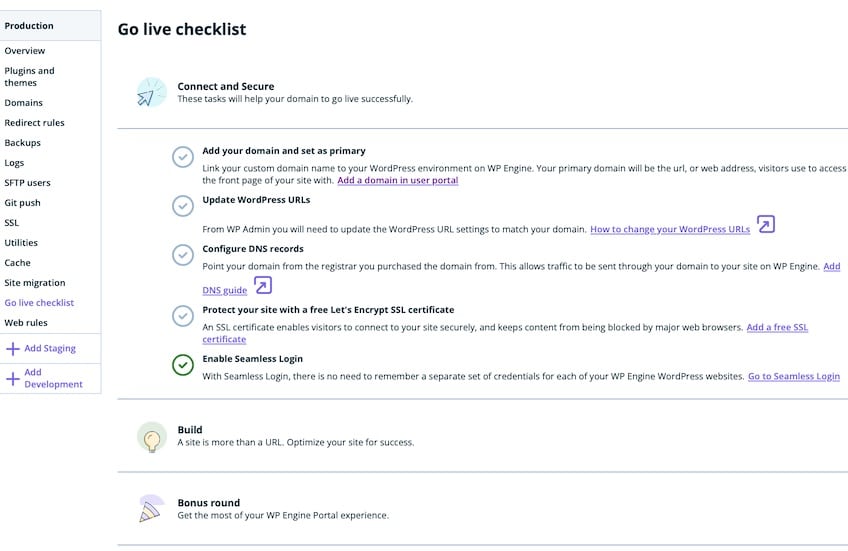
All WP Engine servers are optimized for maximum WordPress security and performance. You’ll benefit from built-in features like automated WordPress and PHP updates, servers that are up to 40% faster than other hosting providers, and proactive threat blocking and security.
With WP Engine, you’ll get the speed you want and rest easy knowing your WordPress sites are as proactively protected as possible from external threats.
Scalability
Since WP Engine is a hosting service dedicated exclusively to WordPress sites and boosting their performance, it is no surprise it scores high marks in the scalability department. You have many different variations of managed WordPress hosting to choose from.
The entry-level Startup plan gives you up to 25,000 site visits per month. As your site grows, you can easily jump up to a higher tier plan and increase your site visits all the way to 400,000. There’s even a custom-priced tier that can give you unlimited site visits. So, as your audience or customer base grows, WP Engine will grow with you.
The same goes for local storage and bandwidth. Start out with 10 GB storage and 50 GB bandwidth per month. If your online shop really takes off and you need more resources, no problem. You can move all the way up to 50 GB and 500 GB, respectively, with the Scaled hosting plan (and, again, even beyond that on the Custom plan).
WP Engine makes it easy to upgrade across all managed WordPress hosting plans.
You can do it yourself through the User Panel by clicking on Billing/Modify Plan. Then, just choose the new managed plan you want and the upgrade happens automatically with no disruption to your site.
There are also WooCommerce hosting solutions available for those of you focused on ecommerce. Whether you start out by building an online store or decide to add shoppable functionality to your site later on, you have room to enhance your hosting plan to match without having to change providers.
If you’re committed to WordPress, WP Engine is a hosting provider that will stick with you for the long haul.
Where WP Engine Could Improve
WP Engine is great at a lot of things, but not perfect. There are a few areas where small tweaks would make a big difference.
Ease of Use (the not so good)
You will not find a website builder included anywhere in WP Engine. You’re going to have to create WordPress websites the old fashioned way—from scratch directly in WordPress itself. Or, you can use a WordPress-centric site builder like Elementor. Either way, you won’t find a drag-and-drop builder within WP Engine.
This might not be the end of the world if you’re considering WP Engine because you’re already a fan of WordPress. Newbies looking for the most beginner-friendly combination of web hosting and website builder should look elsewhere, though.
Likewise, if you are not comfortable meddling in the behind-the-scenes intricacies of keeping a website functional, you might struggle a bit with hosting on WP Engine. Yes, the User Portal is easy enough to navigate, but actually getting things done can feel intimidating to inexperienced users.
For example, when setting up redirect rules, WP Engine presumes you have an understanding of how and why you want to do it in the first place. There’s not a lot of beginner-friendly guidance here. If you don’t understand the why, you’re going to spend a lot of time educating yourself to get things done.
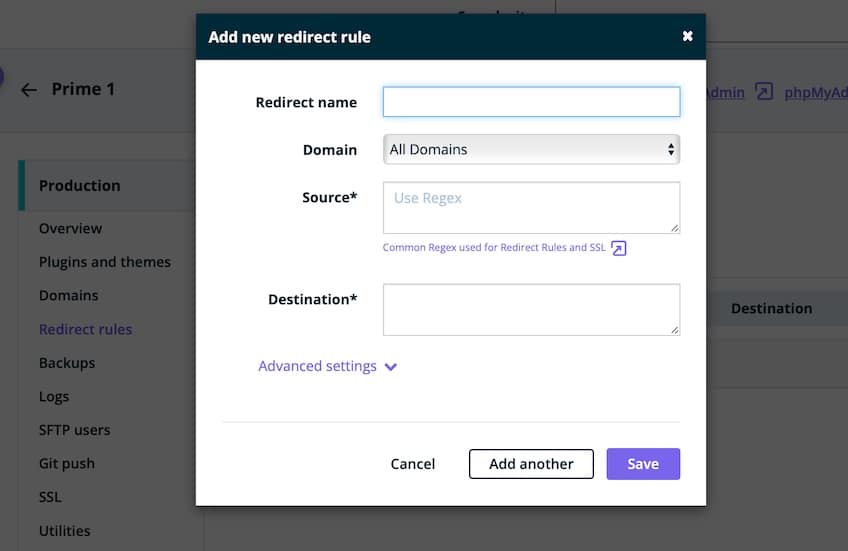
There are quite a few backend processes like this where you’ll need to have some technical knowledge to make the most of a WP Engine subscription.
Migration is another area where WP Engine falls short, at least compared to other providers on this list. If you’re a small website, you’ll need to do the migration yourself with a WordPress plugin. Support is available if you run into trouble, but for the most part you’ll be on your own.
It just feels like automated migration is something WP Engine could offer to really round out their product.
Customer Support
WP Engine’s customer support is not terrible, by any means. But, compared to some of the other providers on this list–and given its expensive price tag–we felt that it’s a bit lacking.
Two examples to prove this come to my mind. One is that if you choose the most basic WordPress hosting plan, you are only entitled to live chat help. Phone support is reserved for only those on higher tier plans. If you want more direct, human assistance, you will either have to go without or pay for a more expensive plan.
Then, there is the availability—or lack thereof—of the live chat support.
We tried accessing it on a Saturday morning and were met with a message at 9:30 a.m. Pacific time that there was no one online to assist us . We were invited to submit a message and someone would get back to us when they came back online.
If our issue had been urgent, this might have been problematic. Think of the lost revenue if we were running an online store and our site was down during our annual sale.
And, when live chat help is available, you may still face a long wait time to actually get help. We saw wait times of 30 minutes or more when testing out WP Engine’s support. On top of that, you’ll first have to navigate through a persistent virtual assistant that constantly tries to keep you from accessing a live representative.
Given that other hosting providers offer much more streamlined and accessible support, this struck us as a crucial missing piece in the WP Engine package, especially for the prices they charge.
There are also options for email support and a ticketing system. In the support ticket area (external to the User Portal), you can find and manage all your open or closed support ticket requests, including any chats you initiated with an agent.
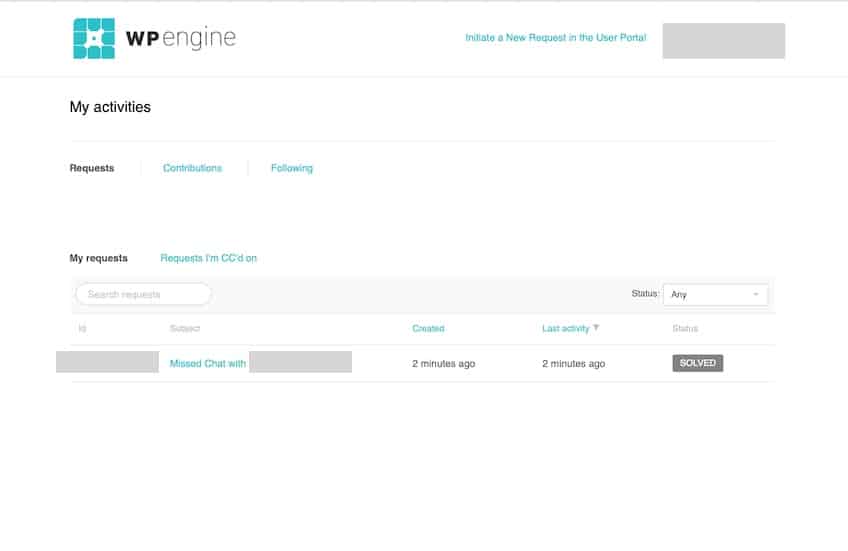
Again, WP Engine’s support isn’t terrible by any means. But it could use a few improvements to make it truly competitive.
Plans & Pricing
WP Engine offers four predefined managed hosting plans.
All include a free SSL certificate, integrated CDN, automatic and on-demand backups, automatic WordPress and PHP updates, and 10 premium WordPress themes from StudioPress.
- Startup: starts at $20 per month; includes one website, 10 GB local storage, and 50 GB bandwidth
- Professional: starts at $40 per month; includes three websites, 15 GB local storage, and 125 GB bandwidth
- Growth: starts at $77 per month; includes ten websites, 20 GB local storage, and 200 GB bandwidth
- Scale: starts at $ 194 per month; includes 30 websites, 50 GB local storage, and 500 GB bandwidth
- Custom: pricing and package parameters set upon request
WP Engine is priced on the higher side of the web hosting spectrum. But, the saying “you get what you pay for” is appropriate here, especially if you are looking for maximum performance for your WordPress site.
Some people reading this review will do just fine with the Startup plan. As your WordPress needs expand, or if you’re already sure you need more than the entry-level allocations, there’s plenty of room for growth.
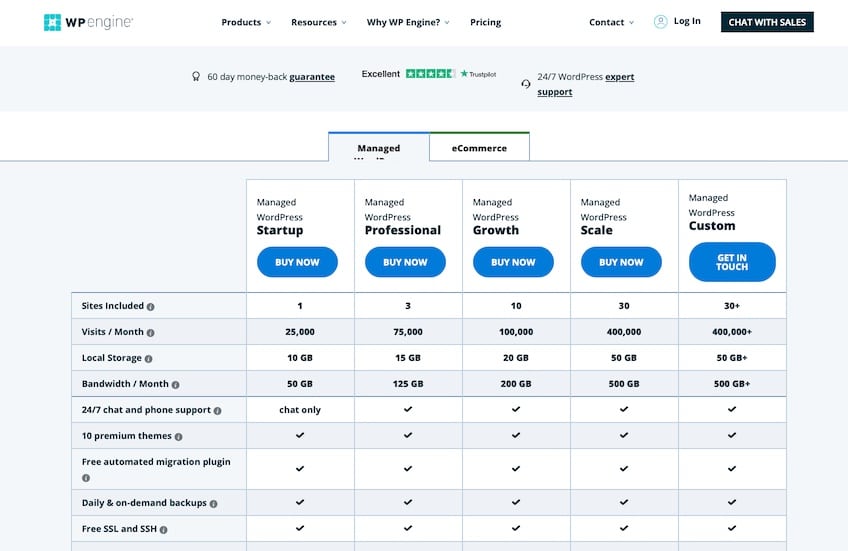
You can choose to pay monthly or commit to a one-year contract when you sign up. However, your lowest price will be with the annual plan.
One important thing to note with WP Engine is that they include a disclaimer on the subscription form that indicates they may charge extra for overages if your usage goes beyond your plan’s limitations. Keep that in mind.
WP Engine keeps its rates pleasantly simple. There are just two contract terms to choose from, with each getting different introductory and renewal rates. For example, WP Engine’s Startup plan runs $24 for your first month, then $30 per month after that when you opt for month-to-month billing. If you go for a one-year commitment up front, you’ll pay $20 per month for the first 12 months, then $25 per month upon renewal.
Let’s break this down further, comparing costs for four years of hosting on the Startup plan.
When you choose an annual contract, you’ll pay $240 at checkout to secure that first year of hosting, then $300 per year for the next three years. Your total hosting expense for the full four years will be $1,140.
Rather go for monthly billing and avoid any sort of commitment? Your initial outlay will be a mere $24 for month one, but then you’ll pay an additional $1,410 for the remaining 47 months. That makes your total outlay for four years of hosting $1,434.
Another important factor to consider when going with WP Engine is what is not included with your hosting fees. In fact, these add-ons are not provided by WP Engine at all. The rationale being that, if these things were offered, it would dilute their focus on WordPress.
To get these services, you’ll need to go through a third party and integrate them on your own with your WP Engine hosting package in the control panel. However, it’s usually better to keep the pieces siloed (if you know what you’re doing) so you can make changes as needed.
- Domain registration: If you don’t already own a domain name, you’ll need to register and pay for one through a domain registrar that you find on your own.
- Domain privacy: Should you want to keep the personal information that is tied to your domain registration shielded from public view, you’ll need to sort that out with your domain registrar.
- Domain renewal: When it comes time to renew your domain name, you’ll pay that directly to your domain registrar and will be subject to their renewal rates.
- Email: If you plan to use email that includes the domain name of the site you’re hosting on WP Engine, you’ll need to find email hosting through a third-party provider.
If you’re not sure how to buy a new domain name, be sure to check out this helpful article of ours on that very subject.
If you get started with WP Engine but change your mind after jumping in, you have a full 60 days to get a refund for the hosting plan fees you paid. It is easy to go through the refund request process on your User Panel.
However, the process isn’t immediate and a support ticket will be opened. A customer support specialist will contact you to complete the cancellation process and eventually issue a refund.
The actual process we experienced was slightly different. One day after we canceled, our refund was issued automatically and we got an email stating that. We never interacted with a customer support person at all.
While WP Engine is an amazing host, it’s overkill for most people, especially if you’re just starting out or on a tight budget. If you’re looking for something else, check out our top web hosting picks to learn more about our favorites and what we recommend for different situations.
